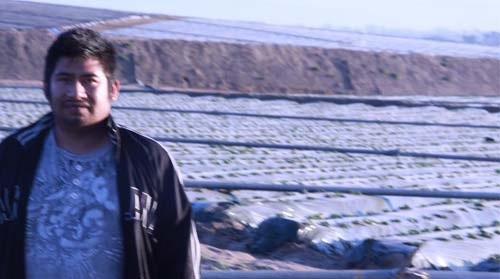
By Jesus E. Valenzuela-Felix
Editor’s Note: California Senator Ricardo Lara’s (D- Huntington Park/Long Beach) Health For All Bill (SB 1005) – it would make all Californians, regardless of immigration status, eligible to receive health insurance – advanced out of the Senate Health Committee on Wednesday, April 30, and will go to the Senate Appropriations Committee before being moved for a vote. Under the Affordable Care Act, undocumented immigrants are barred from either purchasing private plans through the exchange, or receiving government subsidized health insurance. In California alone, there are an estimated 1 million undocumented immigrants who lack health care.
Below is the story of an undocumented farmworker family in Salinas, the Toledanos, which now faces insurmountable medical debt due to being uninsured.
MAY 19, 2014 — How much does it cost to live? $200,000. That’s what Jorge Toledano discovered when he opened his mother’s hospital bill.
“My mother was having convulsions,” said Toledano. “We (still) don’t know exactly what happened. My sister found her chocking in her sleep, and tried giving her mouth-to-mouth. I knew it was bad, because she was twitching, her voice was gone, and she couldn’t even speak. When I sat her up she vomited, and from there I called my grandmother and told her that my mother was in bad shape and we didn’t know what was wrong with her. Then I called the ambulance.”
Toledano, 28, is a farmworker, like the rest of his family. He came to California from Mexico at the age of 14 in pursuit of the American Dream because at home there was nothing to eat. He made the trek from his home in San Martin Peras, Oaxaca, to San Diego, California, and was a migrant farmworker in Mexico long before he came to the U.S. – as a kid he picked tomatoes in Sinaloa, where there are neither bathrooms nor water for workers, and where being indigenous means putting up with strong racism from the mestizos, or mixed-race Mexicans. Toledano’s first language is not Spanish but Mixteco, an indigenous language. As Toledano puts it, the goal has always been survival. Prosperity? Maybe that will come later.
Stories like Toledano’s are commonplace these days in the farming regions of California. Economic conditions at home have forced entire generations of Mexicans to move north, with the promise that if they worked hard enough they would get ahead. But in the Toledano’s line of work, wages are low and health risks associated with the occupation – due to the physical nature of the labor and exposure to harmful agricultural pesticides and chemicals – are high.
“She was in the hospital all day Monday and Tuesday, and it wasn’t until late Wednesday that she opened her eyes,” Toledano said of his mother.
Help us save local journalism!
Every tax-deductible donation helps us grow to cover the issues that mean the most to our community. Become a 48 Hills Hero and support the only daily progressive news source in the Bay Area.
It turns out she was suffering from Meningitis, a viral infection that causes inflammation of the areas around the brain and spinal cord, that can lead to serious symptoms such as vomiting, convulsions and fever. Doctors, said Toledano, were unable to confirm exactly when or where she contracted the virus.
A full week in the hospital was followed by four days resting at home. Toledano and his sister followed up by accompanying their mother to an outpatient clinic.
“As we were waiting in the clinic she began to get convulsions. My sister was there and as soon as she noticed that something was wrong, we held her hands. When she was convulsing I felt that she was going to die. I screamed, ‘Help her, please, help her!’ I was crying. The clinic called an ambulance and we went (back) to the hospital. She went in on a Thursday and left on a Wednesday. After leaving the hospital we came to the house, but it was as if we’d brought home a dead person. She had no idea where she was.”
The bills for the two weeks combined came out to more than $200,000. The ambulance ride alone cost over $3,000.
Asked if he’d be able to pay the bill on his own, Toledano, laughing, said, “Maybe if I stop eating for a whole year. A farmworker makes on average $25,000 a year. If I had insurance, of course, it would help.”
Toledano applied for Medi-Cal on behalf of his mother, but the application was denied because she is undocumented.
“I don’t know how we’ll be able to pay,” he said. “We barely make enough to pay the rent.”
After 14 years of working hard and saving up, Toledano is completely broke. What little money he had managed to save up has gone to help pay for the medical bills. By the time this article is published he’ll be in Oxnard, working the same cycle that he’s been following for years, picking strawberries there, making $9 an hour, working ten hour days for 6 days a week, hoping to not get sick or do something that will impede him from working. When the season ends, he’ll be back at home in Salinas.
Despite it all, he talks with a smile. Life has been hard, toiling in the fields through the dirt and sweat, but he has faith that everything will turn out fine. Pity, said Toledano, is the last thing he would want from anyone. Rather, the recent nightmare with his mother has him hoping for something else entirely — to live in a society where equality means equality, regardless of immigration status.
This story comes from New America Media.





